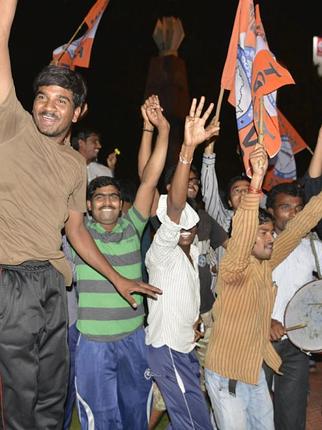New Delhi, October 3: Amid the continuing political turmoil in coastal Andhra and Rayalseema that followed the Congress Working Committee (CWC) resolution of July 30 requesting the Centre to form a separate State of Telangana, the Union Cabinet on Thursday evening gave its seal of approval to a Home Ministry proposal to divide Andhra Pradesh.
A string of resignations from the Union Council of Ministers followed, with Human Resource Development Minister M. Pallam Raju, Textiles Minister Kavuri Samba Siva Rao, Minister of State for Tourism Chiranjeevi, and Minister of State for Railways Kotla Surya Prakash Reddy putting in their papers.
If the day here began with anti-Telangana supporters shouting slogans outside Prime Minister Manmohan Singh’s residence, with members of the United Andhra Pradesh Students Association trying to break the barricade, forcing the police to use mild force to disperse the protesters, it ended with the Cabinet meeting at which two of the four ministers — who have since resigned — vociferously opposing the decision to create Telangana.
Mr. Kavuri Samba Siva Rao complained that the process of consultations with those from coastal Andhra and Rayalseema had not been properly conducted, and expressed reservations about the future of Hyderabad. Mr. Raju, making a strong pitch for a united Andhra Pradesh, also focused on Hyderabad, stressing that it had been a great source of employment and revenue generation that would now be denied to those from Rayalseema and coastal Andhra.
Prime Minister Manmohan Singh gave a firm assurance that justice would be done to the people of the residuary State of Andhra Pradesh.
On the Telangana side, Science and Technology Minister S. Jaipal Reddy provided his Cabinet colleagues with a potted history of the long battle for Telangana. Tribal Affairs Minister Kishore Chandra Deo was not present, as his mother had just passed away.
Of the senior ministers, Finance Minister P. Chidambaram, Health Minister Ghulam Nabi Azad — both closely involved in the entire process — spoke in favour of Telangana, while Rural Development Minister Jairam Ramesh said there should be no further delay in implementing the CWC decision.
Emerging from a more than two hour meeting, Home Minister Sushilkumar Shinde, who made the initial presentation at the meeting, said a Group of Ministers will be set up to work out the various legal and administrative measures to ensure the safety and security of the residents of all the regions of the State, including the guarantee of the fundamental rights. Hyderabad, he added, would be the joint capital of Telangana and the residuary State of Andhra Pradesh. Members of the GoM would include the Unions Ministers of Home, Finance, Human Resource Development, Health, Irrigation, Power, Environment and Forests and Railways, as well as the Deputy Chairman of the Planning Commission.
In the backdrop of the agitation that followed the CWC’s decision, the GoM would also “go into the various issues which concern both States and suggest appropriate measures to address them,” an official statement said. It would “also work out the modalities for provision of special financial disbursements required for the setting up of a new capital for the residuary State of Andhra Pradesh and to meet the special needs of the backward regions and districts of the two States.”
India’s 29th State, Telangana, will cover 10 of the 23 districts of the undivided Andhra Pradesh: Adilabad, Karimnagar, Khammam, Mahaboobnagar, Medak, Nalgonda, Nizamabad, Rangareddy and Warangal, besides Hyderabad.
The government took more than two months to take the CWC’s historic, if contentious, decision forward as it faced stiff resistance from within the Congress, including Chief Minister Kiran Kumar Reddy, Union Ministers, MPs and MLAs. Protests across coastal Andhra and Rayalseema forced the Congress to set up a committee, headed by Defence Minister A.K. Antony, to look into the grievances of the people of these regions.
Government sources now say it is likely to take at least six months to complete the formalities for the new State of Telangana as the move involves a number of steps, including the adoption of a state re-organisation Bill by Parliament through a simple majority, the setting up of an expert committee by the Union Finance Ministry to recommend measures for a smooth transition in terms of financial management and viability of the reorganised state.
A dedicated unit will be set up in the Planning Commission to deal exclusively with the reorganised state under the direct charge of the Deputy Chairman. With better financial management and adequate devolution of funds from the Centre, the unit will ensure multifaceted development of the region, especially in core infrastructure.
The Home Ministry will prepare another note for the Cabinet with the re-organisation bill, on the basis of the recommendations and suggestions of the GoM, requesting the Cabinet to approve the state re-organisation bill and recommend to the President to refer the Bill to the legislature of the State.

